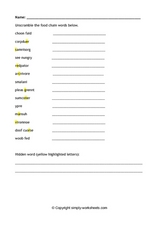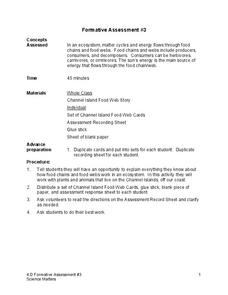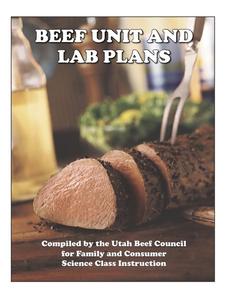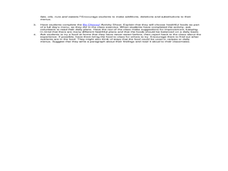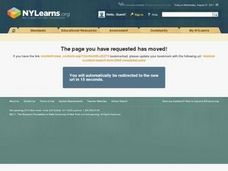Curated OER
Food Chain
Fourth graders explore the concept of food chains. In this food chain lesson, 4th graders discuss what different animals eat and how they are all connected. Students explore a garden and the environment around them to find examples of a...
Curated OER
Prairie Food Chains & Webs
Students complete a food chain. In this ecosystem lesson, students learn about producers, consumers and decomposers. Students identify herbivores, carnivores and omnivores and complete two worksheets.
Curated OER
Food Chains
Fourth graders study food chains, producers, consumers, and decomposers. They play a food chain game and create food chain mobiles or posters. They take a nature hike around the school and observe various parts of a food chain.
Simply Worksheets
Food Chain Word Scramble
In this food chain words worksheet, learners unscramble the food chain words and then find a hidden word. Students unscramble 14 words total.
Science Matters
Formative Assessment #3
Thirteen short-answer questions follow a brief food web activity in a formative assessment designed to test knowledge of ecosystems and the energy that flows through them.
Curated OER
Food Chains
Students investigate the food chain. In this ecology lesson, students define producers and consumers. Students use organism cards to demonstrate how the food chain works.
Curated OER
Food Chain: what's for dinner?
Fourth graders identify where foods came from and sequence a food chain. In this food chain lesson plan, 4th graders define vocabulary related to food chains and order a food chain. Students follow the energy of a food chain. Students...
Curated OER
Lessons: Food Web
Students use an interactive web-based food web game to gain familiarity with tropic levels and interactions. They already understand that in an ecosystem there are four basic tropic levels: producers, primary consumers, secondary...
Baylor College
Your Energy Needs (BMR)
How many Calories one needs on a daily basis is dependent on a number of factors including gender, height, and activity level. In the third of seven lessons about energy and food, young nutritionists calculate the number of Calories...
Baylor College
Your Nutrition Needs
It takes some work to ensure you have a balanced diet, but once you know the types of foods that are good for you, it becomes second nature. In the sixth of seven lessons about energy and nutrition, learners create a healthy eating plan...
Curated OER
Ecosystem Game
Students examine the ecosystem by playing a game. In this ecosystem lesson, students are put into groups of decomposers, consumers, and producers. Students create a list of animals that fit into each group and items that represent...
Curated OER
Producers, Consumers, and the Food Chain
Third graders discuss producers, consumers, and the food chain. In this producers and consumers activity, 3rd graders talk about organisms, the food chain, and the difference between producers and consumers. They complete review...
BioEd Online
Muscles and Bones: Nutrition
Got milk? Or almonds, sardines, or tofu? Calcium is important throughout life, but especially so for developing bodies. If teens do not consume enough calcium while they are growing, they are at a much higher risk of osteoporosis and...
Utah Beef Council
Beef Unit and Lab Plan
What are the proper methods for cooking various cuts of beef? What are some basic rules regarding meat food safety? Here you'll find 10 lab plans with a variety of beef cookery activities, perfect for a home economics or cooking course.
Desert Discoveries
What's For Dinner?
Youngsters compare the teeth of plant-eating dinosaurs with those of meat-eating dinosaurs. The concepts of herbivore vs. carnivore are also introduced. There is an excellent worksheet embedded in the plan which shows five skulls of...
Curated OER
How Do Foods Help Our Bodies
Learners investigate the specific elements found in food that keep us healthy. In this healthy eating instructional activity, students identify proteins, carbohydrates, minerals, and vitamins as part of a healthy diet when consumed in...
Curated OER
Food Travels and Preservation
Fourth graders study food processing and distribution. In this food processing lesson, 4th graders investigate various methods of food preservation. Students study methods of food distribution.
Shelby County Schools
How Ecosystems Work
How does one organism get its energy? What is the main source of energy in an ecosystem? How does the flow of energy affect different types of ecosystems? Answer these questions with a fill-in-the-blank worksheet.
Curated OER
Seepy Sandwich
Pupils explore Earth science by participating in a pollution activity. In this water infiltration lesson, students utilize a water sprayer, food coloring and slices of bread to simulate how pollution can spread into our drinking water at...
Bridge
Mercury - Mercury is Rising
Hold a discussion in your class about the increase in mercury being found in fish that are caught commercially as food for humans. Given a worksheet, learners then calculate how much fish a person can safely eat each month to remain...
Curated OER
Plants 'R' Us!
Students investigate the interdependencies of plants and animals, and study what a food web is. They create a food web using yarn and images.
Curated OER
Marshland Ecosystems
Students identify animals in ecosystem depicted on 16th Century ceramic basin and classify them as herbivores, carnivores, or omnivores based on physical characteristics and prior knowledge, determine which life forms in ecosystem are...
Curated OER
Feeding: Fast Food
Students calculate the rates of feeding for the average baleen whale, and compare the energy requirements of whales with humans.
Curated OER
Race To Win Project
Students develop proper work and personal skills that will enable them to become competent and confident adults. Students analyze basic nutritional habits. Students evaluate sport/athletic food patterns.





